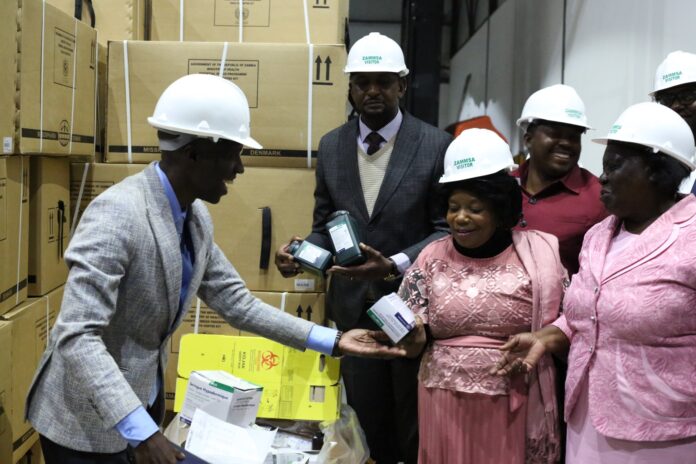MakanDay had the opportunity to interview Billy Mweetwa, the current Director General of the Zambia Medicines and Medical Supply Agency (ZAMMSA). Mweetwa took up this position in August 2022, following a critical period for the agency. In February of the same year, the ZAMMSA Board took a decisive step by placing the entire agency management on compulsory leave. This action was prompted by ongoing investigations into a series of significant irregularities that had plagued the institution. These irregularities revolved around the distribution of defective medications, which had been sourced from Honeybee Pharmacy.
This interview has been edited for brevity and clarity.
When was the last time that government procured medicine in large quantities?
Billy Mweetwa (BM): The procurement for these health centre kits in such large quantities was carried out three to four years ago, and the last batch of kits had to be withdrawn from public distribution due to various reasons. Currently, we have ongoing bulk procurements from the United Nations Family, specifically United Nations Children’s Fund (UNICEF) amounting to approximately US$13 million, and United Nations Development Programme (UNDP)amounting to US$9 million. These procurements are focused on obtaining essential medicines. Additionally, there is a US$2 million fund, known as a matching fund, that we have secured through UNFPA for reproductive health commodities. Of particular significance is the procurement related to mental health commodities, which has been an area of concern, and these supplies will be sufficient to cover the entire year of 2023. Furthermore, we are also engaged in government-to-government procurement to address shortages of the magnitude we have been experiencing.
Why did the Ministry choose to engage Missionpharma for the procurement of health centre kits when the contract was terminated by the previous government?
BM: We have a contract with Missionpharma, and we cannot engage in any procurement without a valid contract. Our current contract with Missionpharma is a one-year contract tied to the supply of 42,000 health centre kits. The contract with Missionpharma was never terminated; it simply expired at some point. One of the reasons Missionpharma ceased supplying was due to the outstanding debts they were owed. It became financially unsustainable for them to continue supplying when payments were not being made. During that phase, we needed a reliable and reputable partner, and Missionpharma, with its long-standing presence of over 20 years in providing health centre kits toZambia, was a suitable choice. They have a proven track record of delivering quality products, and at one point, they even assembled the health centre kits locally. By engaging in direct bidding with Missionpharma, we aimed to ensure business continuity, meeting the criteria of the right price, right quality, and timely delivery. The procurement of health centre kits usually takes 6 to 9 months to produce the required quantity. We pushed for a six-month delivery period to meet our needs.
Has the government resolved the outstanding debt of approximately $16 billion owed to Missionpharma? Additionally, has the government addressed the $2.2 billion debt owed to other pharmaceutical companies?
BM: When the Missionpharma contract expired, there was an outstanding debt, as you mentioned (estimated at US$16 million). Continuing the supply under such circumstances was no longer feasible for Missionpharma. One of the conditions for resuming supply was for the government to clear the debt, which was done in 2022. The current procurement is funded through a live budget, and we are utilising letters of credit for financing. Each shipment of 7,000 health centre kits allows us to retrieve the cost of the letter of credit, resulting in a saving of 50 health centre kits. The funds for the one-year procurement of 42,000 health centre kits, totaling US$28 million, are already in the bank. The K2.2 billion mentioned is still under the Ministry of Health’s purview, and they are best positioned to provide accurate information. ZAMMSA does not inherit any debts and operates on a debt-free budget, which enhances the confidence of our suppliers. The government-to-government procurement is governed by a Memorandum of Understanding (MOU) and involves collaborative manufacturing, with the Unified Procurement Authority (UPA) being the counterpart government institution. UPA has contracts with various suppliers or manufacturers in Egypt, while ZAMMSA’s role is to ensure regulatory compliance, quality, safety, and efficacy of the products through regulatory mechanisms. This procurement approach does not pose a threat to the Zambian pharmaceutical sector but rather provides an opportunity for local manufacturers and suppliers to grow their capacities.
What is the cost of the drugs being procured by the ministry, and how long is the contract for the drug procurement?
BM: The total value of drugs being procured in Egypt is US$35 million. The drug supply chain does not depend solely on Egyptian procurement but rather incorporates multiple factors to address our current situation, including the procurement of health centre kits from citizen suppliers. There is an additional K340 million for local suppliers and we have assisted them in financing their contracts. We are utilising financing tools, such as letters of credit, which were implemented for foreign entities like Missionpharma, to support our suppliers. The funds currently in the banks serve multiple purposes, including ensuring timely commodity delivery.

Discover more from MAKANDAY
Subscribe to get the latest posts sent to your email.



